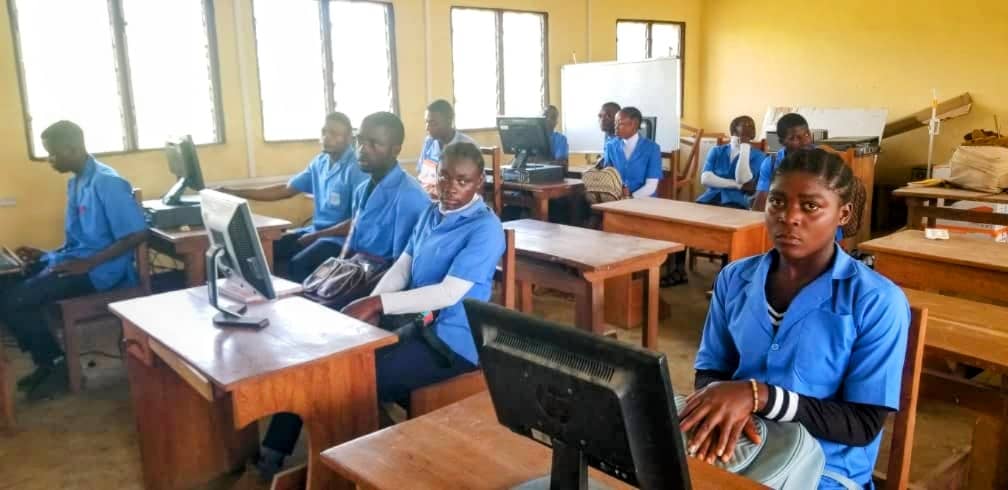By Olive Ejang
Education stakeholders in Kupe Muanenguba Division, South West Region are living through the changes that have come with technology and government’s digitalisation policy, sweating it out and making gains in the process.
Theirs, is a story of glory and sweat, being fashioned out in a typical rural setting with a goal of connecting young Cameroonians across Kupe-Muanenguba to the advantages of digitalization.
The quest for fresh touch to digitalization in schools surfaced during sector conferences in the basic and secondary education sectors staged in the Divisional headquarters of Bangem recently.
The Basic Education sector conference was staged under the theme: “Digitalization of Instructional Processes and Reinforcement of Moral and Citizenship Value for the Transformation of Education”.
In the secondary education sector, exchanges during this year’s sector conference were guided by the theme: “Digitalisation and Classroom Practices for Modernization of Teaching and Learning at the Ministry of Secondary Education”.
Stakeholders emerged from the meetings, appealing to the ministers concerned to make adjustments that meet the needs of the rural areas.
Digitalisation Guarantees protection
The Divisional Delegate of Secondary Education, Kupe Muanenguba, Enongene James Njume, said digitalization guarantees the protection the school system from unpredictable health hazards. The policy, he said also ensures that the education system moves alongside developments in technology.
He said with the crisis in the North West and South West regions, class attendance is affected seriously. “This cutting edge technology is indeed a proper solution,” he added.
Enongene assured that schools can now get lessons and cover their syllabuses comfortably even during days when they do not go to school. He said that is how the 2021 examination was easily implemented.
Need for Partnerships
The delegate continued that to overcome challenges with digitalization in schools, authorities can develop partnership to equip schools with the needed machines instead of building more class rooms.
He added that instead of elite buying books and pens to support schools, they should consider using the same money to buy digital devices that can help students.
Enongene stated that the delegation has a project to train teachers in Tombel and Bangem on the implementation of digitalization in classrooms.
He said the minister of Secondary education has provided solar plants to some schools in the division like GTHS Tombel, GBHS Bangem, GTHS Bangem and other schools within Kupe Munenguba.
Coping With Digital Changes
Speaking to The Ultimate, the Principal of Government Bilingual High School, GBHS, Bangem, Mesumbe Bernard said, digitalization is important to schools because it facilitates learning. He added that digitalization will solve the problem of lack of teachers and modernizes teaching and learning process.
Mesumbe boasted that at GBHS Bangem, they are implementing online lessons from MINESEC platform. He said they review downloaded lessons from tablets donated by MINESEC in their multimedia lab. He said they have created WhatsApp study groups for some classes.
However, the principal said their major challenge is the lack of regular electricity supply, inability of some students to afford smart phones, unreliable telephone network for internet, the irresponsible attitude of some learners viz-a-viz the use of smart phones.
The principal proposed that schools should purchase generators. Communities, the principal said, need to be sensitized to embrace digitalization and mobile telephone service providers should improve the quality of services.
For Glovise Forsoh, principal of Bain Ladder Institute, Bangem, his institution has moved from manual recording of various pedagogic and administrative data to processing by computer.
He said their institute now produces digital report cards, class lists, and control sheets.
However, Forsoh stated that they lack of enough computers and personnel for proper implementation.
Hurdles To Digitalisation
According to a teacher cum Councillor, Ekome Mwene Richard, it will take about fifty years for schools in rural Cameroon in general and Kupe Muanenguba in particular to be digitalized.
Mwene observed that good roads, electricity, mobile telephone network, good infrastructure and gadgets are necessities for the realization of effective digitalization in schools.
He lamented that Kupe Muanenguba is highly enclaved, with majority of the villages in the hinterlands, characterized by lack of electricity and mobile telephone networks. Mwene said epileptic electricity supply and mobile telephone networks are experienced in villages with electricity.
The councillor regretted that schools in villages within Kupe Muanenguba are inaccessible because of bad roads. “I wonder how digitalization can be effective within schools in the rural sector,” the Councillor marveled.
For Donatius Ewane, a parent in Tombel, the government must construct befitting structures in schools to harbor innovations. He said roads must be accessible for the easy transportation of equipment like computers, projectors and other gadgets.
According to Ewane, before talking digitalization, schools in rural sector should have befitting libraries and computer laboratories with internet facilities. He said if all these facilities are not installed in rural schools, then the much talk of digitalization is a farce.
Glory Emade told The Ultimate that teachers must be adequately trained to effectively function with digitalization. However, she regretted that 90 percent of parents in rural sectors cannot afford gadgets for their kids.




